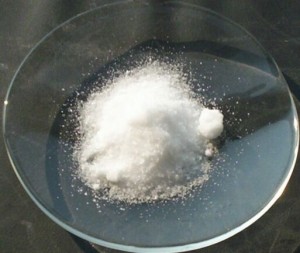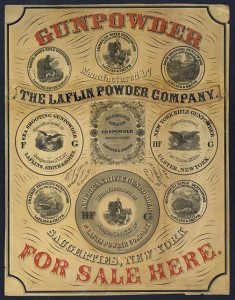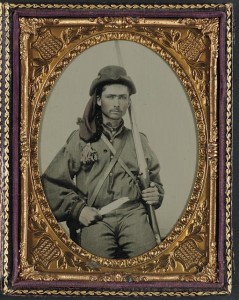Here a Richmond, Virginia newspaper from 150 years ago sees the Union blockade that is limiting Confederate access to gunpowder as another blessing in disguise because it will help the South be more self-reliant. Also, Confederate citizens will have a chance to earn some good money by creating artificial nitre (saltpetre) beds. Potassium nitrate was an essential ingredient to make gunpowder.
From the Richmond Daily Dispatch March 6, 1862:
The production of saltpetre — something for every man to do.
We beg leave to call the attention of our citizens to an important subject connected with the maintenance of our cause, and upon which absolutely depends our capability of self-defence. The blockade of the Lincoln Government, although incomplete, and in many respects merely nominal, interposes obstruction to commerce sufficent to prevent our reliance upon foreign nations for articles of prime necessity in the conduct of the war.–In fact, one of the compensatory advantages incident to the present exigency of our affairs, is the self-dependence which is imposes. Our people so long accustomed to procure by exchange for their own productions, whatever they might require, had become almost entirely helpless. Suddenly thrown upon their own resources, they seemed bewildered at first, but soon this paralysis passed away.–Their energy and enterprise sought channels for exercise, the multiplied wants of the crisis were supplied, and now we are fast approaching a condition of independence.
The Confederate Government has exhibited from the beginning an anxious desire to encourage and stimulate the efforts of the people in this direction, and for this purpose has offered rewards to industry greater than would be given under different circumstances. It has been especially liberal in the encouragement afforded to all enterprises set on foot for supplying munitions of war. We have among us all the elements necessary to furnish these in abundance if a sufficient amount of labor with comparatively small capital is turned in the proper direction. Thus, while affording profitable employment to large numbers of our citizens who would otherwise remain idle during a period of general business stagnation, the Government assists in developing the resources of the Confederacy, and teaches the important lesson of self-reliance.
It is well known that we have within ourselves all the materials necessary for the manufacture of powder, which is the very life blood of war, but some preliminary preparation is required before they can be converted into the proper form for use. Saltpetre, which constitutes three-fourths parts of the whole, is not found in sufficient quantities, already made, to meet the demands of the present enormous consumption, and our powder mills, therefore, are not employed to the full extent of their capacity. The sources from which it can be obtained, however, are inexhaustible, and only a little labor and capital are required to procure it in the amplest abundance.
The War Department, some time since, offered thirty-five cents per pound for all saltpetre delivered before the 1st of January, 1862, but in order to induce its manufacture by our own people at home, has proposed to give fifty cents per pound for all that is made within the Confederacy until January, 1863 and for all made from artificial beds 50 cents per pound until January, 1864. When it is remembered that saltpetre is sold in Bengal at-three cents per pound, and actually taken in payment of taxes by Prussia and Sweden at six cents per pound, and that we have equal facilities with them for its manufacture, the liberality of the Government and the lucrativeness of the business will be apparent. …
Later in the same article A. Snowden Piggot, M. D., a distinguished chemist explains how to make a nitre bed – it would seem to be quite a malodorous venture:
These conditions are fulfilled in practice by the construction of heaps containing earths and putrefiable substances. A clay surface is selected, and a heap formed of loose porous earth, mixed with old mortar, air slacked lime, soft porus limestone, wood ashes, &c., and interstratified with vegetable matters, such as corn stalks, tobacco stalks, sun-flower stems, &c., and various sorts of animal refuse, such as putrid meat, blood from slaughter houses, leather clippings, street scrapings, excrements, &c. The heap thus formed is kept moist by such liquids as urine, meat washings, suds of soft soap, or any other putrefiable solution. Holes are made through it to admit the air and liquids to the centre of the mass, and it is frequently turned over. When a white efflorescence appears upon the surface it is scraped off, and so, as the ripening goes on, the heaps gredually diminish in size. The earth removed is subjected to a treatment by itself in new heaps for the purpose of concentrating the nitre prior to lixiviation. The most convenient size for these heaps is six feet high, six or seven wide, and fifteen long. It is estimated that twelve cubic fathoms of such earth will yield an annual product of a hundred weight. An estimate can be easily made from these data of the extent to which it is desirable to carry this process. It is customary to arrange a number of these heaps beside each other, leaving sufficient space between them for convenience of working. They must of course be protected from drenching rains and from floods, at the same time that they are fully exposed to the air. …
Later in the war Aaron Snowden Piggott, M.D. set up and ran a laboratory to produce medical supplies for the Confederate military. The facility was built in Lincolnton, North Carolina. The effectiveness of the Union blockade made the facility necessary.
Actually, the Confederate Powder Works, which began operation on April 10, 1862 in Augusta, Georgia was a very successful operation that supplied Confederate gunpowder needs throughout the war. George Washington Rains was in charge of the works, which ran along the banks of the Augusta Canal for two miles. George Rains and his brother Gabriel have been referred to as the Confederacy’s Bomb Brothers. In his History of the Confederate Powder Works George Rains gives credit to Jefferson Davis for early on realizing the crucial importance of the South producing its own gunpowder. Rains also talks about how perfect the Augusta location turned out to be. He also takes pride in his ability to mechanize much of the work in refining saltpeter. Between eight and ten thousand pounds of saltpeter were used daily at the Augusta works. Today only the Powderwork’s chimney still stands.




![Chimney of old Confederate Powder [Works] Mill, Augusta, Ga. (between 1900 and 1910; LOC: LC-D4-33102) Chimney of old Confederate Powder [Works] Mill, Augusta, Ga. (between 1900 and 1910; LOC: LC-D4-33102)](https://www.bluegrayreview.com/wp-content/uploads/2012/03/4a17060r-239x300.jpg)